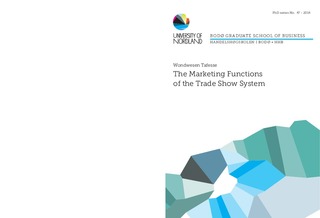The marketing functions of the trade show system
Doctoral thesis
Permanent lenke
http://hdl.handle.net/11250/140372Utgivelsesdato
2014Metadata
Vis full innførselSamlinger
Originalversjon
Tafesse, W. (2014). The marketing functions of the trade show system (Doctoral thesis). University of Nordland, Bodø.Sammendrag
Trade shows have a long history that goes back to at least the early Middle Ages. In those times, trade shows played significant trading roles by facilitating bartered exchanges of textile goods, leather goods, spices and precious metals among long haul merchants. Trade shows have undergone significant changes since then and the contemporary trade show system supports far flung commercial activities. Today, trade shows facilitate purposeful interactions and collaborations among diverse market players, foster the formation of industrial and consumer markets, create substantial economic incentives to various economic actors and contribute to regional development.
The purpose of this dissertation is to gain deeper understanding about the marketing functions of the contemporary trade show system. The dissertation takes, as its point of departure, the idea that the complexity of the functions of the trade show system can be best understood through analyzing the behavior and activities of the individual actors involved. To this effect, the dissertation singled out trade show exhibitors, trade show visitors and trade show organizers – the three most important actors of the trade show system – and investigated different aspects of their behavior and activities. This was accomplished by designing and conducting a series of empirical studies, which generated several valuable and interesting insights about the marketing functions of the trade show system and the behavior and activities of the main actors inside it.
The dissertation makes two substantive strands of theoretical contribution to the trade show literature. The first strand of contributions comes in the form of an integrative conceptual synthesis of three theoretical perspectives: the exhibitor perspective, the visitor perspective and the organizer perspective. The synthesis is based on an exhaustive review and synthesis of the trade show literature around three core themes consisting of profile, motivation and effectiveness. The second strand of contributions comes in the form of a series of detailed empirical studies which are published in different scientific journals. The purpose of the empirical studies was addressing the main research questions posed in the dissertation and shedding some useful light on different aspects of the behavior and activities of trade show exhibitors, trade show visitors and trade show organizers.
Beskrivelse
Doctoral thesis (Ph.D.) – University of Nordland, 2014
Består av
Paper I: Tafesse, W., Korneliussen, T. and Skallerud, K. (2010). Importance performance analysis as a trade show performance evaluation and benchmarking tool. Journal of Convention and Event Tourism, 11(4), 314-328. doi: 10.1080/15470148.2010.533106. Author's accepted version (post-print) is available at: http://hdl.handle.net/11250/140155Paper II: Tafesse, W. and Korneliussen, T. (2012). Managing trade show campaigns : why managerial responsibilities matter? Journal of Promotion Management, 18(2), 236-253. doi: 10.1080/10496491.2012.668434. Author's accepted version (post-print) is available at: http://hdl.handle.net/11250/140143.
Paper III: Tafesse, W. and Korneliussen, T. (2012). Identifying factors affecting consumers purchase incidence at retail trade shows. Journal of Retailing and Consumer Services, 19(4), 438-444. doi: 10.1016/j.jretconser.2012.04.005. Author's accepted version (post-print) is available at: http://hdl.handle.net/11250/140151.
Paper IV: Tafesse, W. Understanding how trade show organizers’ resource deployment strategies influence attendance levels. Manuscript accepted for publication in European Journal of Marketing. Full text not available in Brage Nord.
